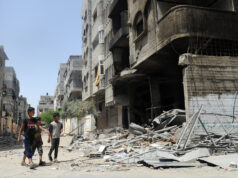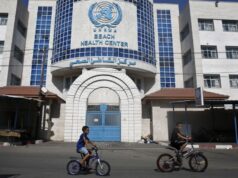The United Nations observer mission in Syria reported Wednesday the discovery of 13 dead bodies found with their hands bound behind their backs. It was clear that many of the newly slain were shot in the head at close range. The bodies were likely killed yesterday, a day that ended with the death of 61 civilians and 37 militants. This week’s violence comes mere days after a massacre perpetrated by pro-government forces in Western Syria left 108 civilians, including many children, dead in the town of Houla. A small percentage of the victims were killed by artillery fire, but most appeared to have been executed by gunfire at close range. This latest attack brings the UN death toll to over 9,000 since the Syrian uprising began in March 2011, although that number is expected to be higher.
Last week’s massacre prompted UN and Arab League envoy Kofi Annan to arrange a meeting with Syrian President Bashar al-Asad; the two met Tuesday to engage in diplomatic talks. Annan expressed concern, on behalf of the entire international community, for the Houla massacre and other regime-led attacks against its own people. Annan urged Asad to act now and adhere to his peace plan, which requires all sides to put down their weapons. On the current situation in Syria, Annan said, “We are at a tipping point“.

Syrian President Bashar al-Asad (R) meets with UN envoy Kofi Annan in Damascus, Syria following a massacre in Houla in which more than 100 people were killed. (Photo: AP/ SANA) |
The recent violence in Syria greatly angered the international community, and compelled over 10 Western nations to expel Syrian envoys from their countries. The White House gave Syria’s top diplomat in Washington three days to leave the country. Canada, Australia, and several prominent European Union nations have also expelled Syrian envoys. In addition, the UN Security Council will meet to discuss ways to end the fighting and the UN Human Rights Council will hold a special session in Geneva on Friday to address the Houla massacre.
But problems — two in particular — are weakening the international community’s diplomatic strength. China and Russia, both of whom have vetoed UN Security Council resolutions seeking tougher action against Syria, continue to disagree with the West on how to handle the Asad regime. Even after the massacre, Russia and China remain opposed to military intervention and instead favor the continuation of diplomatic dialogue. Russia’s timidity is likely to due to the fact that it has many interests in Syria that it does not wish to upset, including a naval base on the Mediterranean coast. Syria also sells gas and oil to Russia, as well as purchases Russian arms.
Action by the U.S. and West to assist Syrians in need is long overdue. Russia and China may be willing to shame themselves and stand by Asad, but their inaction should not affect the decision-making in Washington and those of its allies. That it does highlights a crucial flaw in American foreign policy. U.S. inaction remains a silent endorsement of the Asad regime’s atrocities and could lead to a worsening of violence. Syria is indeed at a tipping point. And Annan’s failed peace plan is not the answer.





